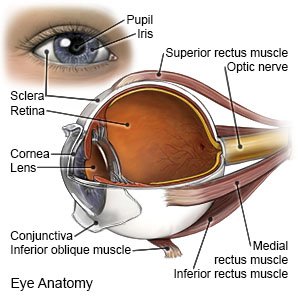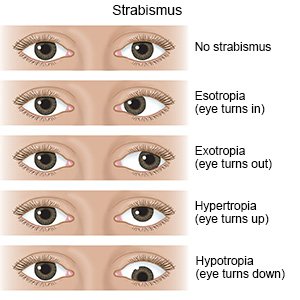Strabismus in Adults
Medically reviewed by Drugs.com. Last updated on Aug 4, 2025.
What is strabismus?
Strabismus is a condition that causes your eyes to look in different directions. Your eye muscles do not work together to control the movement of your eyes. This condition may only occur sometimes, or it may be present all the time.
 |
What causes strabismus?
Strabismus may be present since childhood. Strabismus that occurs during adulthood may be caused by conditions such as Graves disease, stroke, head injury, or eye injury. In some cases, the cause of strabismus may be unknown.
What are the signs and symptoms of strabismus?
- An eye that wanders or turns in, out, down, or up

- Crossed eyes
- Blurred or double vision
- Increased sensitivity to bright light
How is strabismus diagnosed?
Your healthcare provider will ask about your symptoms and examine your eyes. Tell your provider about any health conditions you have or medicines you take. You may need any of the following:
- A vision exam is done to check if strabismus has affected your vision. You will be asked to read letters on reading charts at a close and far distance.
- A refraction test measures the prescription you need for eyeglasses or contact lenses. You will be asked to look at a chart through a device that has lenses of different strengths. You will be asked if the word or picture is clear as the lenses are changed.
- An alignment and focusing test may be done to check how well your eyes focus, move, and work together. This is also known as a motility (movement) test.
- Blood or imaging tests may be needed to find the cause of your strabismus.
How is strabismus treated?
- Eyeglasses or contact lenses can help your eyes work together.
- Eye exercises help improve your eye movement and focus. Ask your healthcare provider about the best eye exercises for you.
- Surgery may be done to change the length or position of your eye muscles. This will help your eyes look in the same direction at the same time.
Treatment options
The following list of medications are related to or used in the treatment of this condition.
When should I call my eye doctor?
- You lose your vision in one or both eyes.
- You have questions or concerns about your condition or care.
Care Agreement
You have the right to help plan your care. Learn about your health condition and how it may be treated. Discuss treatment options with your healthcare providers to decide what care you want to receive. You always have the right to refuse treatment. The above information is an educational aid only. It is not intended as medical advice for individual conditions or treatments. Talk to your doctor, nurse or pharmacist before following any medical regimen to see if it is safe and effective for you.© Copyright Merative 2025 Information is for End User's use only and may not be sold, redistributed or otherwise used for commercial purposes.
Learn more about Strabismus
Treatment options
Care guides
Symptoms and treatments
Further information
Always consult your healthcare provider to ensure the information displayed on this page applies to your personal circumstances.
